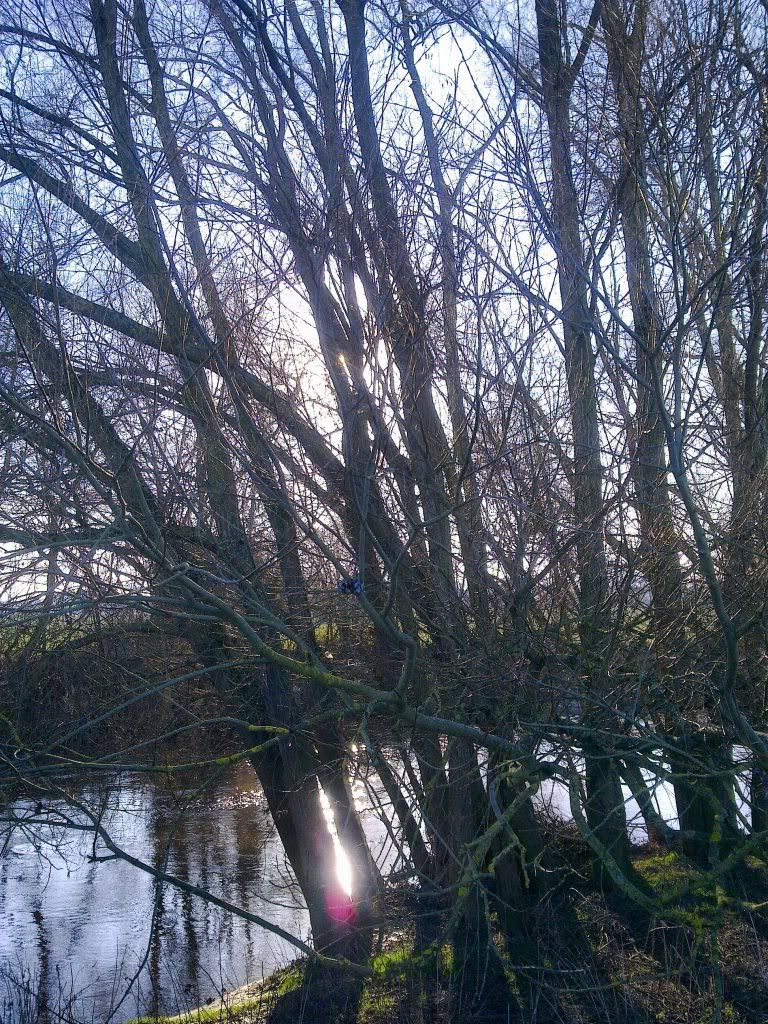
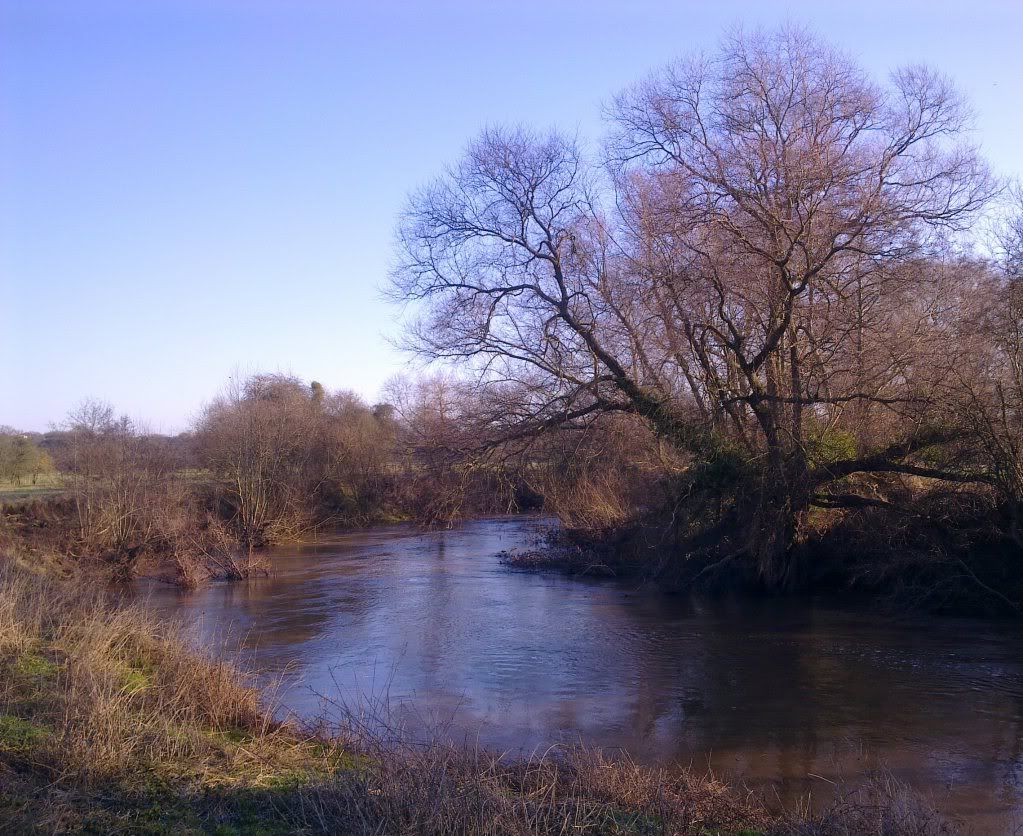
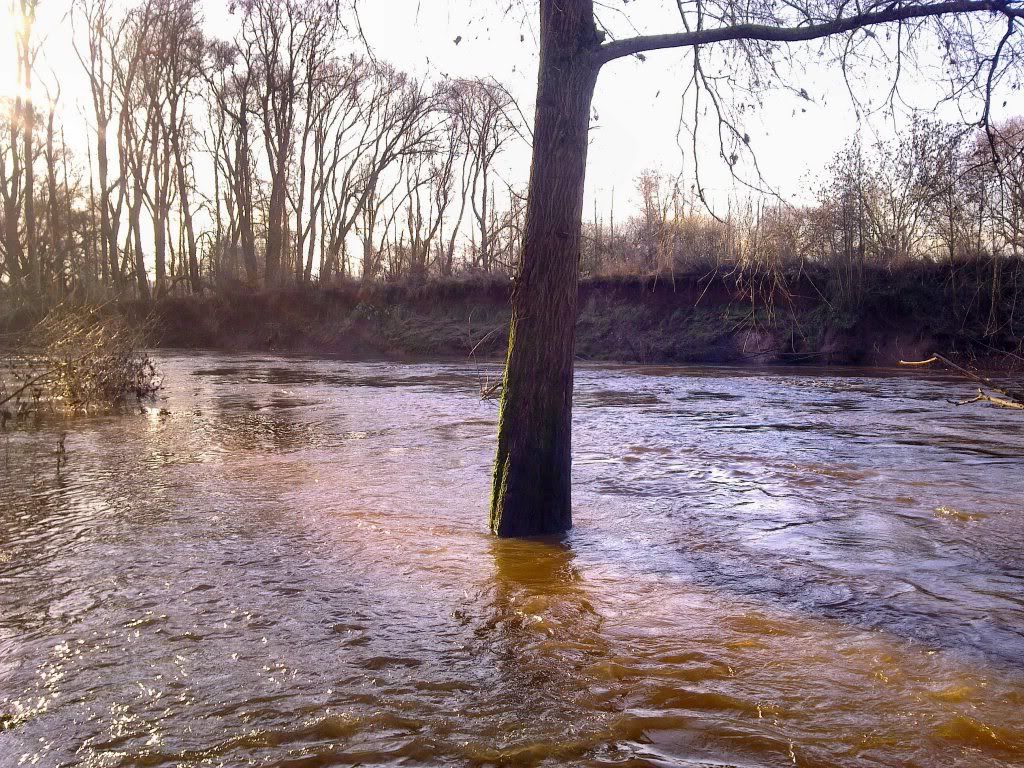
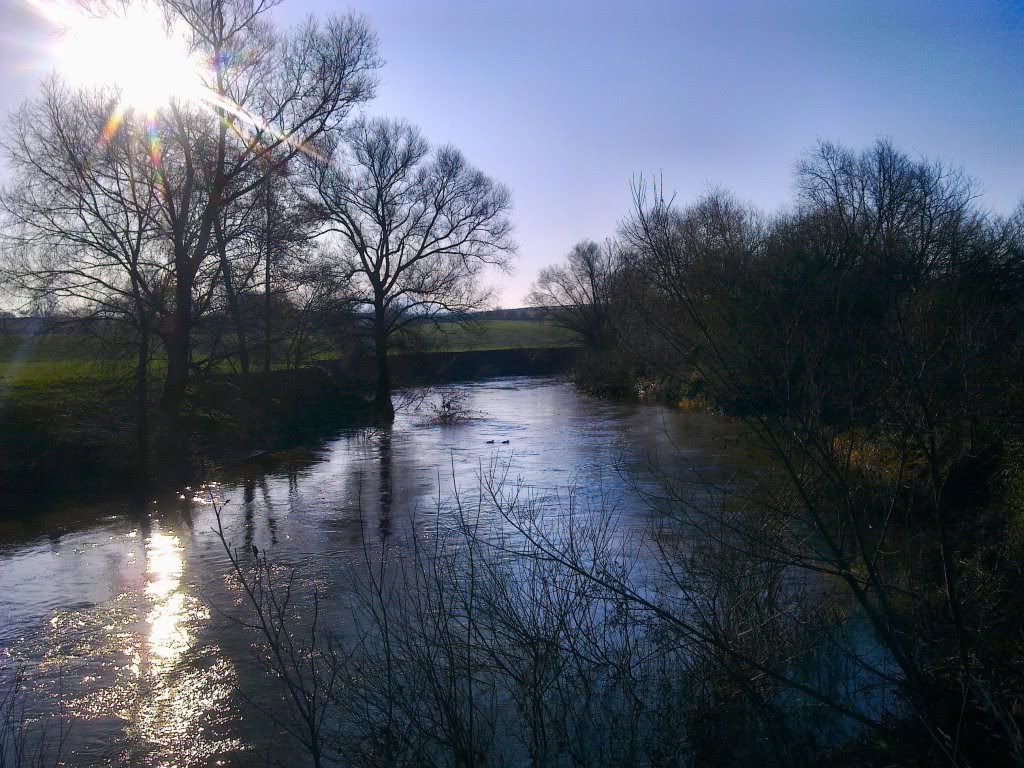
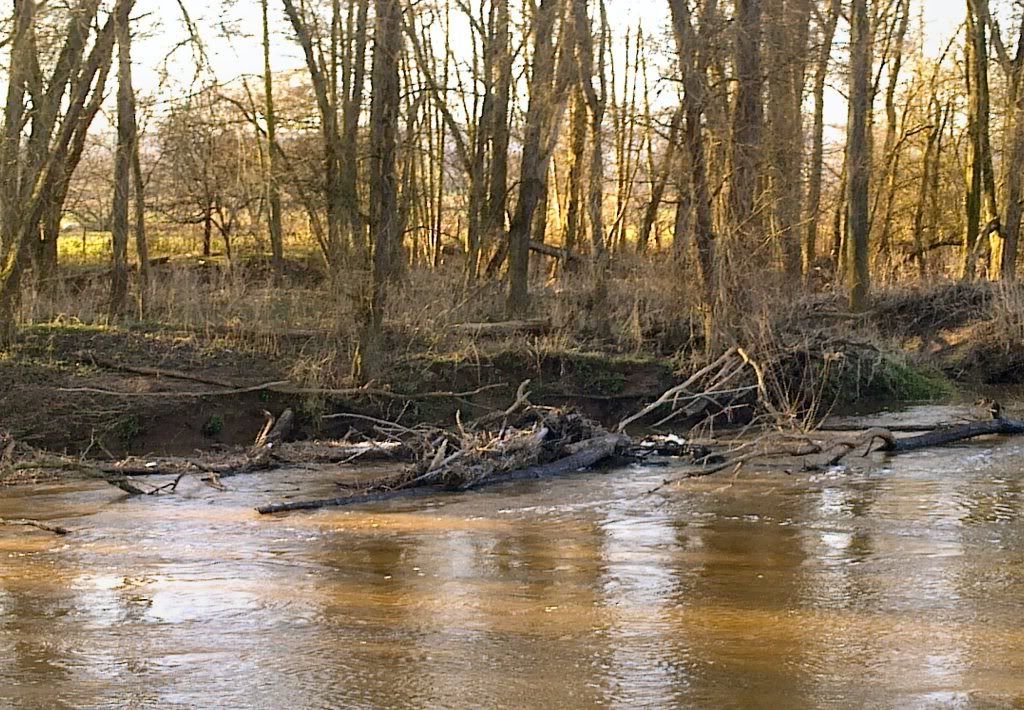
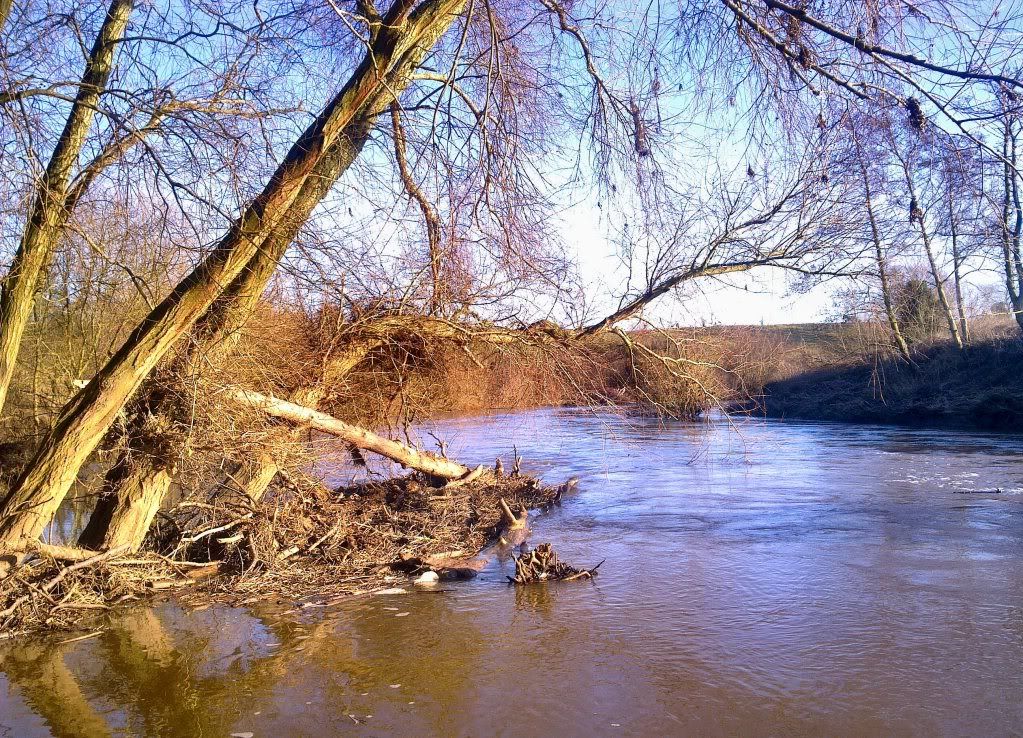
Top: New Years Day on the Teme was bitterly cold, but staggeringly beautiful.
Second from Top: In July this swim was deep in undergrowth.
Upper Middle: In Spring there was a shingle beach on the other side of this tree where I cast to grayling & trout.
Lower Middle: It was still warm enough in October for me to have a kip on the bank by this bend.
Second from Bottom: Otters made their holt here in the Spring - are they still there?
Bottom: There are rumoured to be big chub here - perhaps there's one waiting under this raft of flotsam...
There are two things about the otherwise brilliant A Passion for Angling that make me wince. One is the overdubbed, toe-curlingly self-conscious and appallingly edited ‘banter’ of the two protagonists. The other is Bernard Cribbins’ overly twee narration. It contains, if memory serves, wildly inappropriate Johnny Morris-esque vocal anthropomorphism (inappropriate because of its dubious selectivity – why give tongue to Bob's dogs while denying a voice to, say, a hooked fish, I wonder?) alongside the constant repetition of hackneyed truisms. One of these aphorisms, which Bernard repeats 350 times in the first episode alone, came to mind the other day; New Year’s Day in fact. It was the one about fishing as merely an excuse for ‘being there’.
I had arrived at the river – the same stretch of the Teme where I have spent the vast majority of my fishing days this season – without an inkling of what kind of fishing I’d do. After a couple of seconds spent in careful consideration of the matter I decided not to do any at all. The sky was a cloudless, blemish-less blue and the light had the shocking clarity of a summer morning in the eastern Mediterranean. The river was four or five feet up and the colour of fudge, and, at 11.00 a.m., the temperature was three below zero, even in the full glare of the sun. All of which led me to the conclusion that my time would be far more enjoyably and profitably spent on an envigorating riverside ramble than freezing on the bank with next to no chance of a fish.
Kicking myself for forgetting my camera and having to rely once again on the camera on my mobile phone, I set off upstream to take a year’s end survey of a section of river which has captured my imagination – and not a little of my heart and soul - this past year.
To my amazement I came, very soon, upon a bloke who was fishing. I stopped and chatted with him for a while. He admitted that he, too, was just ‘being there’ rather than properly fishing, even as he wielded the accoutrements of his art. He had come all the way from Birmingham and wanted to stay out and relish the peace and beauty of the day, albeit in the knowledge that he would catch nothing.
I sauntered on, remembering with fondness the balmy days of the extended summer past. I walked up to a swim that I’d had to battle through a near impenetrable wall of head high nettles to reach. Now, a flattened bed of dead and rotting stems was all that remained between the path and the water. The hanging branches of the huge Willow through which I had deftly cast and had a barbel first chuck one misty dawn in July, were bristling with vital silver green foliage back then. Now they were lifeless tendrils trailing, bony and bare, in the muddy water.
Moving on, I spotted the top of a familiar hawthorn bush poking through the boiling surface. In June I had cast a dry fly from the opposite bank to the grayling which lurked in the eddy beneath it. Then, the bush was at the end of a long shallow pool full of greedy grayling and trout rising freely to yellow may duns. Now it looked like it might, at any moment, be swept away by the power of the water that cascaded over, though and around it. The comparison of what it had been, given what it now was, seemed preposterous.
I walked on as far as a spot where, as recently as October, I had indulged in one of my favourite pastimes – an al fresco kip. I had crawled through a deep bed of himalayan balsam to get to a castable pitch on the inside of a tight meander and had managed to get the bait where I wanted it - underneath a great sunken log which lay midstream. The heady smell of the balmy blooms must have got to me and before long I had nodded off, lying there on the bank. The next thing I knew my rod (on which I always seem to maintain a reliable grip regardless of my state of consciousness) was being wrenched ‘round into an impressively tight arc and I was into a battle with a 9½ lb barbel which looked and felt a lot bigger than it eventually turned out to be – as usual. That spot was now submerged under three feet of rushing water.
I was still musing on this strange change from major to minor when, stumbling from the bank side vegetation back onto the path, I flushed a woodcock. For those who’ve never done it let me assure you it can be a terrifying experience. Woodcock spend much of the daylight hours lying doggo in the undergrowth, brilliantly camouflaged by beautiful cryptic plumage. This is their primary tactic against predation. They do not move until they are about to be eaten - or trodden on - as was the case with this particular bird. They rise rapidly and vertically before flying directly away from the threat with a wildly zigzagging flight. It is as if they have evolved to evade the shotgun. They haven’t, of course – I imagine their erratic flight pattern is designed to evade capture by birds of prey, but I could be wrong.
At last I came to the long, slow bend in the river to which I had been heading. Here, two fallen and partly submerged trees (which have been in situ for 6 years to my knowledge) had, in early spring, come to my attention as the site of an otter holt. I wanted to see what the trees looked like at this time of year. To me, an angler and dilettante naturalist, the contrast between seasons over the course of the year is incredible enough but, for the otters, the stakes are far higher. The prevailing conditions are the hand that nature deals them and how they play it can be the difference between life and death…STOP! hang on a minute, I appear to be turning into Bernard Cribbins: stop me before I start talking in otterish.
I didn’t see any otters. Nor would I hazard a guess as to whether they still had a holt hidden somewhere within the sunken branches of those waterlogged trees. I shall be going back a fair bit between now and spring in the hope of a genuinely big chub (7lb being the target – which is huge in my book), so I’ll keep an eye out – not just for the otters, but for my own pleasure in observing how the place changes through Spring, into Summer and the next year’s snow. Doing so is a big part of why I go fishing; so much so that sometimes I can’t even be bothered to get the rods out.
Happy New Year - and many thanks - to all who’ve dropped in over the past twelve months.
Note.
My apologies to Cole Porter, T.H. White, Vashti Bunyan and anyone else whose work I may inadvertently have plagiarised in this, and other, pieces.
1 comment:
Very good. As you say being by a river gives us so much more than an occasional fish.
Post a Comment